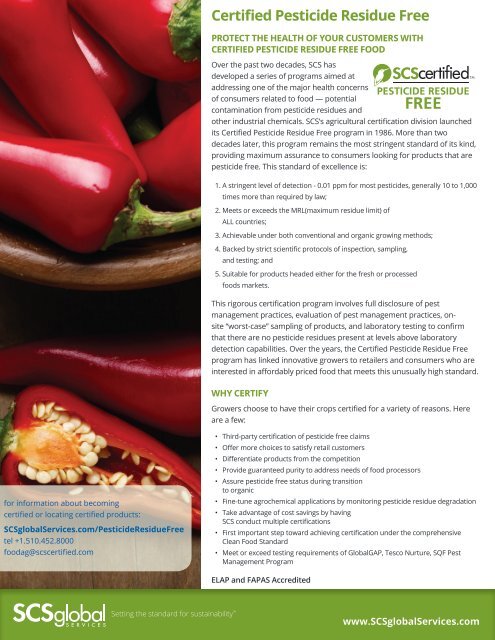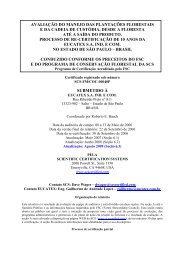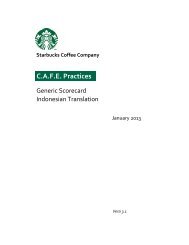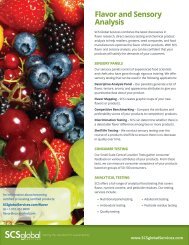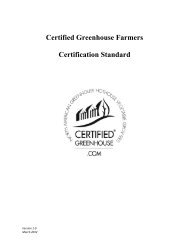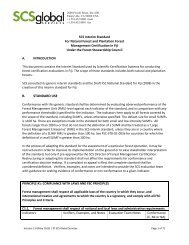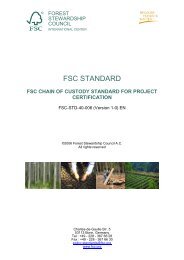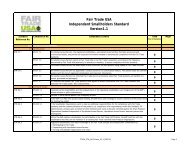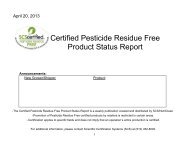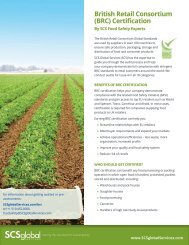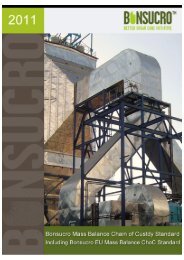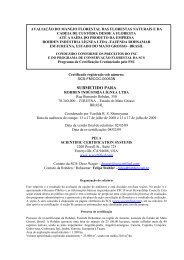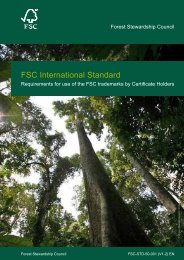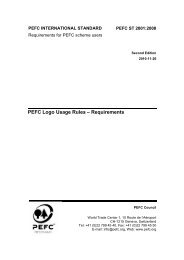Certified Pesticide Residue Free - SCS Global Services
Certified Pesticide Residue Free - SCS Global Services
Certified Pesticide Residue Free - SCS Global Services
Create successful ePaper yourself
Turn your PDF publications into a flip-book with our unique Google optimized e-Paper software.
<strong>Certified</strong> <strong>Pesticide</strong> <strong>Residue</strong> <strong>Free</strong><br />
PROTECT THE HEALTH OF YOUR CUSTOMERS WITH<br />
CERTIFIED PESTICIDE RESIDUE FREE FOOD<br />
Over the past two decades, <strong>SCS</strong> has<br />
developed a series of programs aimed at<br />
addressing one of the major health concerns<br />
of consumers related to food — potential<br />
contamination from pesticide residues and<br />
other industrial chemicals. <strong>SCS</strong>’s agricultural certification division launched<br />
its <strong>Certified</strong> <strong>Pesticide</strong> <strong>Residue</strong> <strong>Free</strong> program in 1986. More than two<br />
decades later, this program remains the most stringent standard of its kind,<br />
providing maximum assurance to consumers looking for products that are<br />
pesticide free. This standard of excellence is:<br />
1. A stringent level of detection - 0.01 ppm for most pesticides, generally 10 to 1,000<br />
times more than required by law;<br />
2. Meets or exceeds the MRL(maximum residue limit) of<br />
ALL countries;<br />
3. Achievable under both conventional and organic growing methods;<br />
4. Backed by strict scientific protocols of inspection, sampling,<br />
and testing; and<br />
5. Suitable for products headed either for the fresh or processed<br />
foods markets.<br />
This rigorous certification program involves full disclosure of pest<br />
management practices, evaluation of pest management practices, onsite<br />
“worst-case” sampling of products, and laboratory testing to confirm<br />
that there are no pesticide residues present at levels above laboratory<br />
detection capabilities. Over the years, the <strong>Certified</strong> <strong>Pesticide</strong> <strong>Residue</strong> <strong>Free</strong><br />
program has linked innovative growers to retailers and consumers who are<br />
interested in affordably priced food that meets this unusually high standard.<br />
WHY CERTIFY<br />
Growers choose to have their crops certified for a variety of reasons. Here<br />
are a few:<br />
for information about becoming<br />
certified or locating certified products:<br />
<strong>SCS</strong>global<strong>Services</strong>.com/<strong>Pesticide</strong><strong>Residue</strong><strong>Free</strong><br />
tel +1.510.452.8000<br />
foodag@scscertified.com<br />
• Third-party certification of pesticide free claims<br />
• Offer more choices to satisfy retail customers<br />
• Differentiate products from the competition<br />
• Provide guaranteed purity to address needs of food processors<br />
• Assure pesticide free status during transition<br />
to organic<br />
• Fine-tune agrochemical applications by monitoring pesticide residue degradation<br />
• Take advantage of cost savings by having<br />
<strong>SCS</strong> conduct multiple certifications<br />
• First important step toward achieving certification under the comprehensive<br />
Clean Food Standard<br />
• Meet or exceed testing requirements of <strong>Global</strong>GAP, Tesco Nurture, SQF Pest<br />
Management Program<br />
ELAP and FAPAS Accredited<br />
Setting the standard for sustainability <br />
www.<strong>SCS</strong>global<strong>Services</strong>.com
CERTIFICATION PROCESS FLOW DIAGRAM<br />
Certification Agreement<br />
Ensures confidentiality of<br />
information; establishes third-party<br />
certification parameters.<br />
Production Information Disclosure<br />
Grower completes disclosure form, describing<br />
pre-harvest and post-harvest pesticide use and<br />
any known historic contaminant issues, and<br />
supplies historic<br />
Food Safety Audited<br />
It is recommended that growers<br />
participate in accredited GAP/ GMP<br />
audit programs for all operations.<br />
Sample Collection<br />
Inspector collects field samples, based on<br />
specialized “worst-case” sampling protocols.<br />
Samples are shipped to lab.<br />
Laboratory Analysis<br />
Samples analyzed using multi-residue<br />
analysis plus specialized analysis as needed<br />
to encompass all pesticides used or likely to<br />
leave residues.<br />
Evaluation of Results<br />
<strong>SCS</strong> evaluates test results to determine<br />
compliance with standards.<br />
Non-compliant<br />
If standard is not met, <strong>SCS</strong> reviews<br />
results with growers to determine<br />
whether further sampling and<br />
testing is warranted, or whether to<br />
deny certification.<br />
Compliant<br />
If standard is met, the product<br />
is certified, valid until the lot is<br />
fully harvested or until additional<br />
pesticides are applied.<br />
Certification Denied<br />
Certification Issued<br />
2000 Powell Street, STE 600, Emeryville, CA 94608 USA | tel: +1.800.326.3228 | fax: +1.510.452.8001<br />
www.<strong>SCS</strong>global<strong>Services</strong>.com


